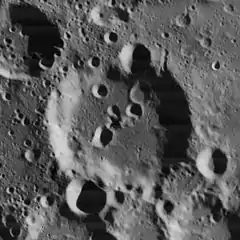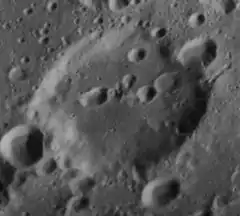Jacobi (crater)
Jacobi is a lunar impact crater that is located in the southern highlands on the near side of the Moon. It lies southeast of the crater Lilius, with Cuvier to the north-northwest and Baco to the northeast. The crater is 68 kilometers in diameter and 3.3 kilometers in depth. It is from the Pre-Nectarian period, 4.55 to 3.92 billion years ago.[1]
 Lunar Orbiter 4 image | |
| Coordinates | 56.7°S 11.4°E |
|---|---|
| Diameter | 68 km |
| Depth | 3.3 km |
| Colongitude | 349° at sunrise |
| Eponym | Karl G. J. Jacobi |

This crater has a worn rim that is overlain by several craters along the southern face, including Jacobi J, and a pair on the northern rim. The result is an outer rim that appears flattened along the northern and southern faces. The larger of the craters on the north rim, Jacobi O, forms a member of a chain of craters that form a rough line across the interior floor from northeast to southwest. The central part of this chain in particular forms a merger of several tiny craters at the midpoint of the floor. The remainder of the floor is level, perhaps as a result of erosion or deposited material.[2]
The overlapping crater triplet of Jacobi F, Jacobi E, and Jacobi G form a line to the south of Jacobi crater.[2] The crater itself is named for Jacobi, a 19th-century German mathematician.[1]
Satellite craters
By convention these features are identified on lunar maps by placing the letter on the side of the crater midpoint that is closest to Jacobi.[3]
| Jacobi | Latitude | Longitude | Diameter |
|---|---|---|---|
| A | 58.5° S | 16.0° E | 28 km |
| B | 54.4° S | 13.9° E | 14 km |
| C | 59.8° S | 10.6° E | 35 km |
| D | 60.8° S | 10.6° E | 21 km |
| E | 58.5° S | 11.8° E | 24 km |
| F | 58.5° S | 9.6° E | 42 km |
| G | 58.4° S | 13.9° E | 42 km |
| H | 58.5° S | 10.6° E | 9 km |
| J | 58.0° S | 10.3° E | 19 km |
| K | 56.7° S | 10.8° E | 9 km |
| L | 55.4° S | 15.4° E | 9 km |
| M | 57.8° S | 12.1° E | 10 km |
| N | 56.3° S | 11.8° E | 8 km |
| O | 55.7° S | 11.9° E | 17 km |
| P | 57.3° S | 13.8° E | 15 km |
| Q | 55.8° S | 14.0° E | 4 km |
| R | 55.3° S | 13.8° E | 5 km |
| S | 57.5° S | 14.9° E | 5 km |
| T | 56.0° S | 15.2° E | 6 km |
| U | 55.0° S | 13.2° E | 7 km |
| W | 56.0° S | 10.8° E | 7 km |
| Z | 59.1° S | 11.9° E | 5 km |
References
- Autostar Suite Astronomer Edition. CD-ROM. Meade, April 2006.
- Rükl, Antonín (1990). Atlas of the Moon. Kalmbach Books. ISBN 0-913135-17-8.
- Bussey, B.; Spudis, P. (2004). The Clementine Atlas of the Moon. New York: Cambridge University Press. ISBN 0-521-81528-2.
- B. H. Foing; J.-L. Josset (August 14, 2006). "Eroded structures in Jacobi crater: a window on the past". ESA - SMART-1. Retrieved 2006-08-25.